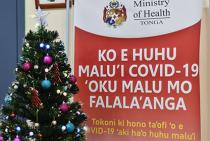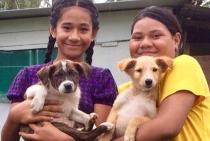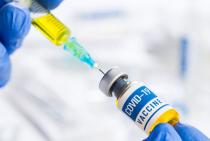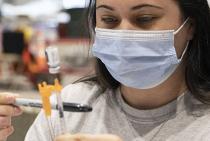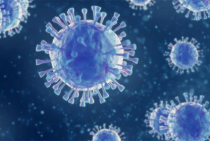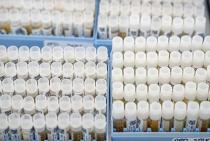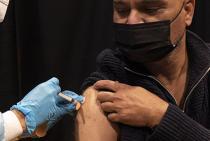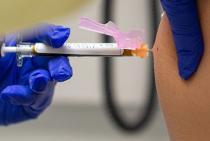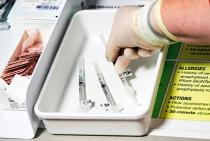Tonga will receive more Pfizer COVID-19 vaccines from Australia in the New Year for booster shots, the Minister for Health, Hon Dr ‘Amelia Tu’ipulotu said today. “We need to speed up the third dose to protect our country from the new Omicron variant,” she said.
You are here
Results for vaccines
Friday 17 December 2021
 Premium content
Premium content
Nuku'alofa, Tonga
Thursday 21 October 2021
 Premium content
Premium content
Nuku'alofa, Tonga
Around 31,600 doses of the Pfizer vaccine arrived from New Zealand last night, and started to roll out today for inoculations of 12 to 17-year-olds and pregnant women in Tonga. There is huge demand and competition for the Pfizer vaccine globally, and the Prime Minister, the Minister of Health and Tonga's CEO of Health all thanked New Zealand for making this “important gift”, which placed Tonga among the few privileged countries of the world to have it.
Tuesday 24 August 2021
 Premium content
Premium content
Nuku'alofa, Tonga
Over 27,152 people have received the second dose of the COVID-19 Astra-Zeneca vaccine in Tonga, since the second roll out program started on June 24 in Nuku'alofa.
Tuesday 10 August 2021
 Premium content
Premium content
Suva, Fiji
Tonga, Samoa, and Tuvalu have begun immunizing children to protect them against cervical cancer, pneumonia, and rotavirus, under a project financed by the Asian Development Bank.
Tuesday 20 July 2021
Nuku'alofa, Tonga
A delivery of 9,000 doses of AstraZeneca COVID-19 vaccines, manufactured in Australia, arrived at Fua’amotu International Airport today, July 20. These doses will be used for vulnerable groups on the outer island of Vava'u.
Wednesday 14 July 2021
Nuku'alofa, Tonga
Tongans can take their pet dogs for parvovirus inoculations, after 600 vaccines were recently provided to the animal care clinic in Tokomololo, Tongatapu.
Wednesday 30 June 2021
Austin-Texas, USA
Outside the rich-country bubble, the virus can spread, mutate, sicken, and kill. One obvious solution is to get the hoarded stockpile of vaccines into arms all around the world - but there have been only "paltry half-measures and insufficient gestures". For now, where this is heading is obvious. The US and Europe are offering crumbs, protecting their billionaires, their pharmaceutical lobbies, and their politicians’ campaign contributions. Meanwhile, China and Russia have other ideas – and the capacity to realize them. So, before too long, when the back of this pandemic is finally broken, the world will have fresh evidence about who is reliable and who is not. - By James K. Galbraith.
Tuesday 18 May 2021
 Premium content
Premium content
New York, USA
New York Times reporting: The United States will send 20 million coronavirus vaccine doses in June to countries struggling against the pandemic, answering calls that the Biden administration isn’t doing enough to help countries that face dire shortages of vaccines and other treatments. This was after WHO director general, Dr. Tedros Adhanom Ghebreyesus called for well-supplied nations to supply harder-hit countries, and for vaccine developers and manufacturers to hasten delivery of hundreds of millions of doses to COVAX.
Thursday 13 May 2021
Geneva, Switzerland
With people everywhere struggling to preserve their livelihoods under the constant threat of the coronavirus, it has become clear that this pandemic is more than a health emergency. It has become a global whole-of-society crisis. In this context, one of our greatest fears is that after decades of improvement, future generations’ prospects have suddenly plummeted. Some regions are experiencing a reversal of gains achieved in the past 20 years. It will be many months – even years – before vaccines against current and future variants of the virus are accessible to everyone. By Palitha Abeykoon, Maha El Rabbat, David Nabarro
Monday 10 May 2021
New York, USA
The combination of export bans, hoarding, and supply shortages has meant that COVAX has so far managed to deliver only one in five of the Oxford-AstraZeneca doses that were supposed to arrive in countries by the end of this month. At this rate, advanced economies will be able to vaccinate their entire populations before many low-income countries even begin their vaccine rollout. By Rosalind McKenna
Tuesday 13 April 2021
New York, USA
New York Times reporting: The AstraZeneca-Oxford vaccine has been deployed against COVID-19 in at least 115 countries, some of them for several months now. But it was not until a few cases of a rare blood-clotting disorder — some fatal — emerged within the past month or so that many European nations began to rethink its use across all age groups. Public health experts, however, have expressed concern that publicity surrounding the rare vaccine-related reactions will fuel hesitancy. They continue to emphasize that the AstraZeneca-Oxford vaccine’s benefits far outweigh the risks. In many nations, it is the only vaccine available.
Tuesday 16 March 2021
 Premium content
Premium content
New York, USA
New York Times reporting: The coronavirus must have infected someone with a weak immune system, allowing it to adapt and evolve for months into far more contagious variants, experts hypothesize. If true, the idea has implications for vaccination programs, particularly in countries that have not yet begun to immunize their populations, especially those with diabetes and other health conditions. People with compromised immune systems — such as cancer patients — should be among the first to be vaccinated, said a virus expert. The faster that group is protected, the lower the risk that their bodies turn into incubators for the world’s next supercharged mutant.
Wednesday 24 February 2021
Kuala Lumpur, Malaysia
Vaccinating the world against COVID-19 is one of mankind’s most critical non-wartime efforts ever. Many countries have developed ambitious, politically sensitive, and carefully sequenced vaccination plans, but executing them successfully will be a challenge. To succeed, policymakers should build three realistic assumptions into their vaccination planning for 2021 and beyond. First, delays are inevitable. By Swee Kheng Khor
Thursday 17 December 2020
Wellington, New Zealand
New Zealand is preparing to support its Pacific partners to access safe and effective COVID-19 vaccines at the earliest opportunity, NZ Foreign Affairs Minister Hon Nanaia Mahuta and Associate Foreign Affairs Minister Aupito William Sio said today in a joint statement.
Wednesday 16 December 2020
 Premium content
Premium content
New York, USA
New York Times reporting: While many poor nations may be able to vaccinate at most 20% of their populations in 2021, some of the world’s richest countries have reserved enough doses to immunize their own multiple times over. “The high-income countries have gotten to the front of the line and cleared the shelves,” said Andrea Taylor, a Duke researcher who is studying the coronavirus vaccines contracts. But the outlook for most of the developing world is dire. Because of manufacturing limits, it could take until 2024 for many low-income countries to obtain enough vaccines to fully immunize their populations.
Thursday 6 December 2018
Geneva, Switzerland
Each year, some 700,000 people die from drug-resistant infections worldwide. But superbugs also pose a threat to the effectiveness of modern medicine; if left unaddressed, antimicrobial resistance (AMR) could make more infections untreatable, cancer therapies ineffective, routine surgeries impossible, and even childbirth unsafe. By Seth Berkley and Jeremy Farrar


